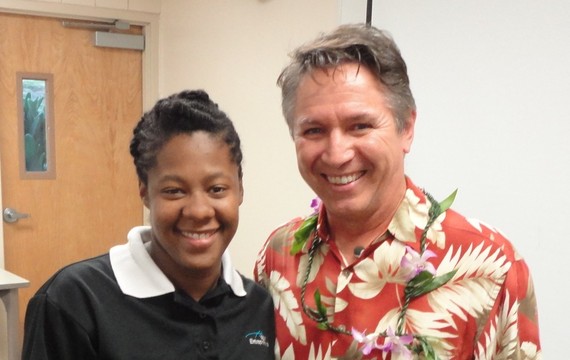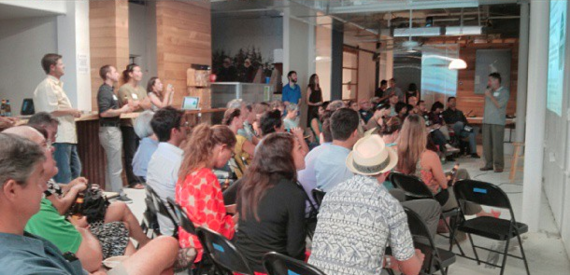Every Wednesday evening the Hogan Entrepreneurs at Chaminade University meet with an entrepreneurial leader. These sessions are intense and students are expected to wring all the important information they can from each speaker. Many sessions lead to important relationships between the students and these leaders — from mentoring, to internships, to jobs and even to partnerships. One such speaker has been Rob Kinslow, a former Director of the Sustainability Association of Hawai’i. He was interviewed recently by Alamoni Copney, a Senior Hogan student from Oahu.
Alamoni: What got you interested in social entrepreneurs & sustainability in the first place?
RK: I grew up on a farm in the middle of Mennonite country in Western Maryland, and spent 18 hours a day in nature, climbing trees, picking fruit and harvesting crops, basically immersed in the stream of life.
Those experiences have brought me to where I am today, a sustainability advisor, to businesses who would like this meme to be embedded in their organizations.
AC: Have you ever heard of the Civilian Conservation Corps or CCC? People say that it’s FDR that we have to thank because he kind of started this whole thing. He sent people out, and they planted three billion trees. And that helped reforest America. It gave the people an awareness of nature, and how we have to protect our natural resources. Do you agree?
RK: I do agree. One of the things you might want to ask when you look at the CCC is, why trees? Well, they did so because the forest from the East Coast to the Mississippi River had, basically, been deforested through the Manifest Destiny policy. The CCC helped re-establish American society’s connection with nature.
Industrialism disconnects humans from the planet we live on, and so, reconnecting with the planet is one antidote for some of the problems caused.
AC: When Al Gore spoke here, he praised the islands for their progress in solar and wind energy, and in research and innovation. Do you think we are on the right track?
RK: Well, the short answer to your question is, no. We are still importing 92% of our energy needs. We are still importing 85% of our food, so despite the progress we made, which is much more rapid and much more robust than most of the world, we are still behind the curve when it comes to true “sustainability.” The only reason we have food in the supermarket, electricity in our homes, and the lifestyles that we do, is because we’re dependent on cheap fossil fuel transporting these goods to the islands.
AC: What do you think our sustainability goal is?
RK: To tread lightly, so that future generations can have an equitable, healthy, natural world and nature can coexist and collaborate with us. We have not yet figured out how to do that because we are still caught up in an industrial development mind set.
Nature has one strategy—to continue life. To date, humans have a destructive strategy. In my view, the goal of human sustainability could be to live in connection with all life on this planet, with essentially the same diversity as when we arrived, available for our children.
AC: So pretty much, a battle between nature and humans?
RK: You can characterize it as such, but if you do, you diminish human potential.We don’t have to use the word battle to describe our relationship with another — we can instead, talk about collaboration, which is what nature does.
AC: Al Gore said that “people are waking up, and they are realizing that we got to make some changes.” What do you think will get the people, here in Hawai’i, to open their eyes, and see what’s going on?
RK: Education is part of the answer. You know, environmental experiences connect people with nature, with the source of all energy in our lives.
That’s why Ma’o Farms and Kahumana Farms, Waihuena Farms, and Kualoa Ranch, are producing environmental experiences for kids—reconnecting children with the sources of their food. Yet, let’s not fool ourselves, this change in human behavior is not sustainability, it is survivability. We are not as yet practicing sustainability.
AC: Should we still have the CCC program?
RK: Well programs like that could be rejuvenated. Government does have a role to play. Government and business can help reconnect humans with nature.
AC: In your talk you said, “real leadership is extraordinary courage by ordinary people.” Could you elaborate on that?
RK: Just because you have a title, status or role in an organization, people say you are a leader. Well, you are a leader of sorts, but where are you leading? By “extraordinary courage by ordinary people” I mean the courage to do something that’s unpopular but has a core value you for you, your tribe, and your society.
Because we are so far behind the curve, we’re going to have to really take some bold steps. We really are THE leaders for a New Sustainable Human. You know the old saying, “where the people lead, the leaders will follow.”
AC: Do you see yourself as a leader?
RK: Leadership is a set of behaviors not a title. So yes. However, I see myself more as a facilitator. My style is to communicate and facilitate the development of other champions.
AC: I think people get sustainability mixed up with Corporate Social Responsibility (CSR). Is there a difference?
RK: Corporate Social Responsibility is an incremental step on the path to sustainability for organizations. It is based on responsibility for compliance with targets for best management practices. It measures closeness in reaching those targets.
But, will CSR get us to sustainability? No. Sustainability is a set of strategies and tactics, a set of values, principles, behaviors, and policies to get us in sync with Nature. CSR is a subset of one of those strategies but it is not a complete coda for living within the biosphere.
AC: You said “to take is to make waste.” Can you talk more about that?
RK: This is the central business model for industrialism. Industrialism says, “let’s take it, let’s make it into something, and then we’ll have to dispose of whatever the consumer decides is waste” which is generally all of it.
Industrialism is the process that has created the “take, make waste process.” Of course, it did create a lot of wealth for a subset of the people along the way.
There have been many benefits to industrialism, but there are consequences. That’s what we are dealing with now. Climate change is one consequence of industrializing.
AC: As you know, in the Hogan Program, our model is, “Doing business things that make social sense. Doing social things that make business sense”. Do you think that we are following that?
RK: Well, I haven’t seen your outcomes, but I do think that instilling those values in people is commendable, and will result in a better practitioner of citizenship. Instilling those values is a worthy process. However, it’s not enough. At this point, with 7B humans on the planet all trying to live according to western industrial standards, humans have degraded Nature to the point that we are closer to collapse than we think, therefore, we need businesses that regenerate Nature. Hogan has “doing business things that make social sense, and doing social sense that makes business sense”, and I say we desperately need business models that regenerate the natural complexity. I would add something to Hogan. I would add an environmental component — “doing things that care for nature.” You know, some kind of regenerative enterprise.
AC: What do you do in the Sustainability Association of Hawai’i?
RK: We are the voice of green business in Hawaii. We educate, advocate, and promote sustainable behaviors in businesses. What I do as the Director of the Sustainability Association of Hawai’i is go out and do talks, like the one I did at Hogan.
AC: Do you get a direct response from them?
RK: Yeah, that’s the point of giving these presentations. People go, “aha.”
I try to get people to see things in a different way. Remember if you “Change the way you look at things. The things you look at change.”
That’s the center-piece of trying to help people see things differently. When we shift our old models of looking at something, the way we deal that thing changes. The way we engage with that object, other being, nature, business, whatever. Humans change.
AC: You said “Entrepreneurs are the artists of the business world.” What do you mean?
RK: Artists are the interpreters and translators of the external world, whether it be photography, or painting, or music. They are interpreting human experience and re-expressing to their audience. Like Artists, Entrepreneurs are out there taking risks, and interpreting the business climate, and then re-expressing that to their customers. Artists are some of the most underpaid, under-appreciated humans in society. Entrepreneurs are also constantly struggling to find funds, and people to help them, and markets to support them. These parallels are why I say that entrepreneurs are artists of the business world.
Full article published on 10/22/2014 on http://www.huffingtonpost.com/john-webster/entrepreneurs-are-artists_b_6018346.html
If you like my posts, why not contribute to helping spread the word?
Thanks in advance for caring and sharing this post on your social media sites



